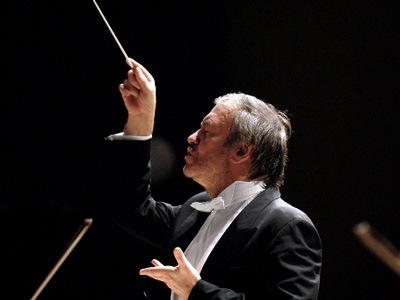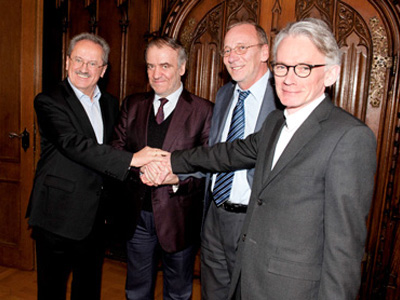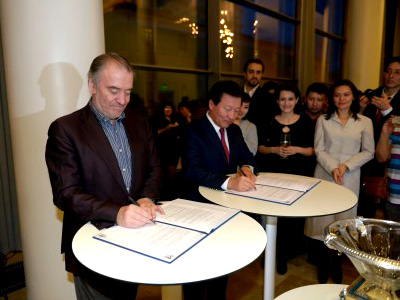
By ANDREW POWELL
Published: April 1, 2014
MUNICH — In every book on time management, there is a chapter about giving your work to someone else. Delegation, they say, is a virtue: an assistant exercises new authority and the delegator accomplishes other tasks, perhaps in other places. Maybe in another country. Or two.
Take Valery Gergiev, incoming Chefdirigent of the Munich Philharmonic. He delegates like a pro, arming répétiteurs and conducting assistants — many of them from St Petersburg’s Mariinsky Theater — with preparatory guidelines to deliver “Gergiev” interpretations on a minimum of Gergiev time. This way, the Russian’s branded, in-person artistry reaches more audiences in more cities. Call it the productization of conducting.
Last December, leading up to and including an MPhil program here, Gergiev conducted a choral concert, three operas, and four Stravinsky works, with three different orchestras in three countries, all in one week.
It was quite a feat. It was also, inevitably, a week of headaches, as the controlling artist jumped between scores on a near-daily basis. Featured: a postponement, a cancellation, anxious last-minute rehearsing, an opera company’s embarrassment, and, in Munich at least, shallow musical results.
The conductor’s devotion to the weightiest project of the week, in Warsaw, offers a clue about how much of what audiences hear in a “Gergiev” performance reflects his work.
Teatr Wielki had hired the Moscow-born conductor for a new production of a Tchaikovsky-Bartók double bill premiering on Dec. 13. Directed by Mariusz Treliński, the film noir versions of Iolanta and A kékszakállú herceg vára were a joint venture with the Metropolitan Opera, where they arrive next January under Guess Who’s baton.
The assignment came with hurdles, given that the opera company’s orchestra was little accustomed to Gergiev’s ways, the principal singers were mostly new to their roles, the compositional styles of the two pieces were unrelated, and the bill involved the Russian and Hungarian languages in performance by mostly Polish musicians.
All this considered, not delegating might have seemed the better part of valor. Indeed, if hearsay is accurate, the week was originally planned at a slightly less frenetic level of activity: just the Warsaw double bill and (on Dec. 18) the Stravinsky pieces in Munich.
The parties understood that of the Warsaw rehearsals Gergiev would lead only the final dress, on Dec. 11. Beyond the premiere, the hearsay has it that he was also to conduct the second performance, on Dec. 15, before heading to Munich. For the remaining dates of the brief run, Dec. 17 and 19, the Poles had engaged a second maestro, young Bassem Akiki.
The hearsay is credible because the non-updated website of Akiki, as recently as today (April 1, 2014), lists the two dates alone, and, when asked about the original slate for Dec. 15, Teatr Wielki did not deny the suggestion that the Russian conductor was at first scheduled.
But Gergiev gave Warsaw much less of himself even than this modest arrangement (Dec. 11, 13 and 15), and in Munich he appeared tired, possibly weakening the Dec. 18 concert. He conducted Teatr Wielki’s Dec. 13 premiere, and he flew to Munich on Dec. 16 to prepare the Stravinsky, only not from Warsaw.
“Unexpected circumstances did not allow maestro Gergiev to lead” the final dress rehearsal on Dec. 11, stated Teatr Wielki in an email response to questions (confirming a separate part of the hearsay), and so it was postponed to Dec. 12, when Gergiev was available. Besides distress for the cast, this change, according to the hearsay at least, caused the cancellation of an unrelated concert on Dec. 12.
The cast affected was: Tatiana Monogarova as Iolanta, Sergei Skorokhodov as Vodyemon, Mikolaj Zalasiński as Robyert, Alexei Tanovitski as Ryenye, Nadja Michael as Judit, and Gidon Saks as Kékszakállú.
“It is absolutely not customary for Teatr Wielki to schedule dress rehearsals one day before a premiere,” wrote the company.
Nor did Gergiev conduct the second performance of Treliński’s double bill. That fell to Akiki, even as company managers were trumpeting the participation of the celebrated conductor.
Instead he bolted, apparently with permission, for St Petersburg and rapid-switch programs at his own Mariinsky Theater: on Dec. 14 the Verdi Requiem and on Dec. 15 La traviata, both necessarily rehearsed by other hands. It was from the Russian city that he flew here.
Warsaw’s astoundingly patient company provided context for Gergiev’s arrangement, pointing out that “the process of rehearsing” (before the final dress) was the responsibility of a Gergiev assistant who “was in constant contact with” the boss. And, in a sign that any change of plan had been agreed: “Maestro Gergiev fulfilled his duties for Teatr Wielki.”
Meanwhile in Munich, normally communicative spokespeople grew taciturn, conceivably out of embarrassment about what they sensed was artistic dissemblance. Still unanswered by the publicly run MPhil are these easy questions:
— How many hours of rehearsal took place for the Dec. 18 Stravinsky program? How many were with Gergiev?
— What does the MPhil normally expect of a guest conductor, in number of days with the musicians and number of rehearsals?
Then again, the Munich Philharmonic has a long stake in this conductor (until 2020) and a bigger problem. He has become hot-to-handle due to his support for Vladimir Putin and his seeming confusion of homosexuality with pedophilia. On Dec. 17, amid Stravinsky rehearsals, he was grappling with testy questions at a news conference about these matters.
And the Dec. 18 Stravinsky concert? It brought fine musicianship with more than a hint of interpretive emptiness. Being a guest here, Gergiev can get away with such perceptions of disengagement, but he must steel himself for heightened subscriber scrutiny once he takes over.
Photo © Alexander Shapunov
Related posts:
Christie Revisits Médée
Gergiev, Munich’s Mistake
Maestro, 62, Outruns Players
Gergiev Undissuaded
Stravinsky On Autopilot



Maestro, 62, Outruns Players
Sunday, November 22nd, 2015By ANDREW POWELL
Published: November 22, 2015
MUNICH — At five o’clock last Sunday afternoon, Munich time, three Mariinsky Orchestras began to play. Two of them launched into Pikovaya dama and Die Zauberflöte at the Mariinsky complex in St Petersburg. The third, here at the Gasteig, opened the accompaniment to a witty Shchedrin vocalise. Such are the possibilities with a roster of 335 musicians, the world’s largest. At the concert, though, the Mariinsky name was bizarrely buried. “MPhil 360°,” screamed the program book cover, “das Festival der Münchner Philharmoniker,” nowhere mentioning the Russian orchestra. The missing credit no doubt mattered less to Valery Gergiev, who now helms both orchestras (or all four, depending on how you count), than the furthering of his new goals: to better relate the Munich Philharmonic to citizens of all walks of life and to programmatically “bridge … German and Russian orchestra culture.” And in this the first MPhil 360° went far, as a lobby- and hall-based three-day jamboree with interviews and attractively priced music in varied formats. Indeed Gergiev himself went far, conducting as festival climax on Sunday five hour-long, off-subscription concerts centered on the Prokofiev piano concertos. Nine hands of Herbert Schuch, Denis Matsuev, Behzod Abduraimov (pictured), Alexei Volodin and Olli Mustonen partnered him at 11, 1, 3, 5 and 7 o’clock, respectively, while scores by Haydn, Mozart, Weber, Reger, the Munich composers Hartmann and Widmann, besides the Munich-based Shchedrin, offered mostly pertinent, mostly Germanic counterforce.
Fortunately for the MPhil’s amenable Intendant, Paul Müller, the extravagant project, at least Sunday’s marathon part of it, proved a logistical and artistic success, even if attendance hovered at 50% of the Gasteig’s capacity. It may or may not have been smart to let the Russians do 60% of the work — assigning them the first two concerts in addition to the five o’clock and leaving less than two hours of music to the day’s titular heroes — but orchestral standards held up throughout as numerous manned Medici TV cameras rolled. As if conducting 300 minutes of music was not enough, Gergiev amiably stood through solo encores and was available for interview during the intermissions. Not incidentally, he dedicated all the concerts to victims of the Islamist murders in Paris.
Hearing five pianists emphasized the disparity of the concertos. The scoring of the compact D-flat-Major work (1912) favors the orchestra, which was dazzlingly unchecked in this performance so that Schuch’s fleet playing could not consistently be heard. Volodin’s sparkle and linear integrity in the left-hand Fourth Concerto (1931) could not overcome the perception, in context, of a drop in creativity in the writing; the pianist more fully advertised himself with a blistering account of the Precipitato from Prokofiev’s Sonata No. 7. Mustonen presented the first three movements of the madly insistent Fifth Concerto (1932) as a unit, with its Toccata a backstop on essentially percussive ideas. But he attempted a round open sound for many figures, quite divergent from, say, Ciani or Béroff. His Larghetto and Vivo offered unforced contrast.
The concertos from 1921 and 1923 fared best. Although Abduraimov’s light touch demanded cupped hands to the ears, he breezed fluently through Concerto No. 3, finding playfulness in its angularity, nonchalance in its lyricism. His reading had a crystalline quality underpinned by decisive, shapely phrasing in the left hand, qualities that rendered uncommon detail in the Variations. To the G-Minor Second Concerto, summit of Prokofiev’s work in this form, Matsuev brought power and evident consideration of its 32-minute arc. Robust rhythms, neatly accented quiet passages, a frame to justly billet the big cadenza, flashes of droll humor in the Intermezzo — and the pianist barely glanced at Gergiev, who took his cues where he could. As encore came Rachmaninoff’s picture etude The Sea and the Gulls, equally intense and played with command of the long line.
If support from the podium in the concertos wasn’t always sensitive, repertory choices elsewhere mostly played to Gergiev’s strengths. The day got off to an alert start with a technically fine performance of Prokofiev’s First Symphony (1917) from the Mariinsky Orchestra. Next came a real Classical symphony, Haydn’s Bear (1786), but this lacked elegance and, consequently, expressiveness. Weber’s Romanticism bookended the second concert and concerto. His Freischütz Overture (1821) benefitted from the maestro’s energy shots at vital moments; the 1841 Berlioz arrangement of his Invitation to the Dance shimmered transparently.
When the MPhil showed up at three o’clock, a closer rapport was apparent between conductor and players (versus two years ago). Reger’s harmonically alluring Vier Tondichtungen nach Böcklin (1913) showcased first the strings (in an Elgarian picture with chances for the concertmaster), then the refined winds, next the whole orchestra (in the duly macabre third tone poem, Die Toteninsel), and finally Munich’s percussion section (in an exuberant bacchanal colorfully scored).
Two hours later the Mariinsky musicians were back, still on superb form, for that vocalise, the episodic and folksy Tanya-Katya (2002) with creamy-toned lyric soprano Pelageya Kurennaya; Hartmann’s Suite from Simplicius Simplicissimus, assembled in 1957 from the revised version of his 1935 opera, in a lively, at times jazzy mix of styles relished especially by the principal trombone; the concerto with Volodin; and, wrapping up a long haul for them, Naughty Limericks, the gaudy 1963 Shchedrin piece, which poorly followed the Prokofiev but was loudly applauded in the presence of the elderly composer, a friend of Gergiev’s. The MPhil’s second concert began with Jörg Widmann’s raucous concert overture Con brio (2008), again unhelpfully programmed with Prokofiev. The composer-clarinetist then played, or rather milked, Mozart’s A-Major Concerto, K622, jumping about the stage like an excited six-year-old, before Mustonen walked on to conclude this engrossing, unrepeatable venture.
Photo © Andrea Huber
Related posts:
Salzburg Coda
Stravinsky On Autopilot
Manon, Let’s Go
Gergiev Undissuaded
Time for Schwetzingen
Tags:Alexei Volodin, Aufforderung zum Tanz, Behzod Abduraimov, Commentary, Denis Matsuev, Gasteig, Hartmann, Haydn, Herbert Schuch, Jörg Widmann, Mariinsky Orchestra, Mariinsky Theater, München, Münchner Philharmoniker, Munich, Munich Philharmonic, Naughty Limericks, Olli Mustonen, Pelageya Kurennaya, Prokofiev, Rachmaninoff, Reger, Review, Shchedrin, Valery Gergiev, Vier Tondichtungen nach Böcklin, Weber, Wolfgang Amadeus Mozart
Posted in Munich Times | Comments Closed